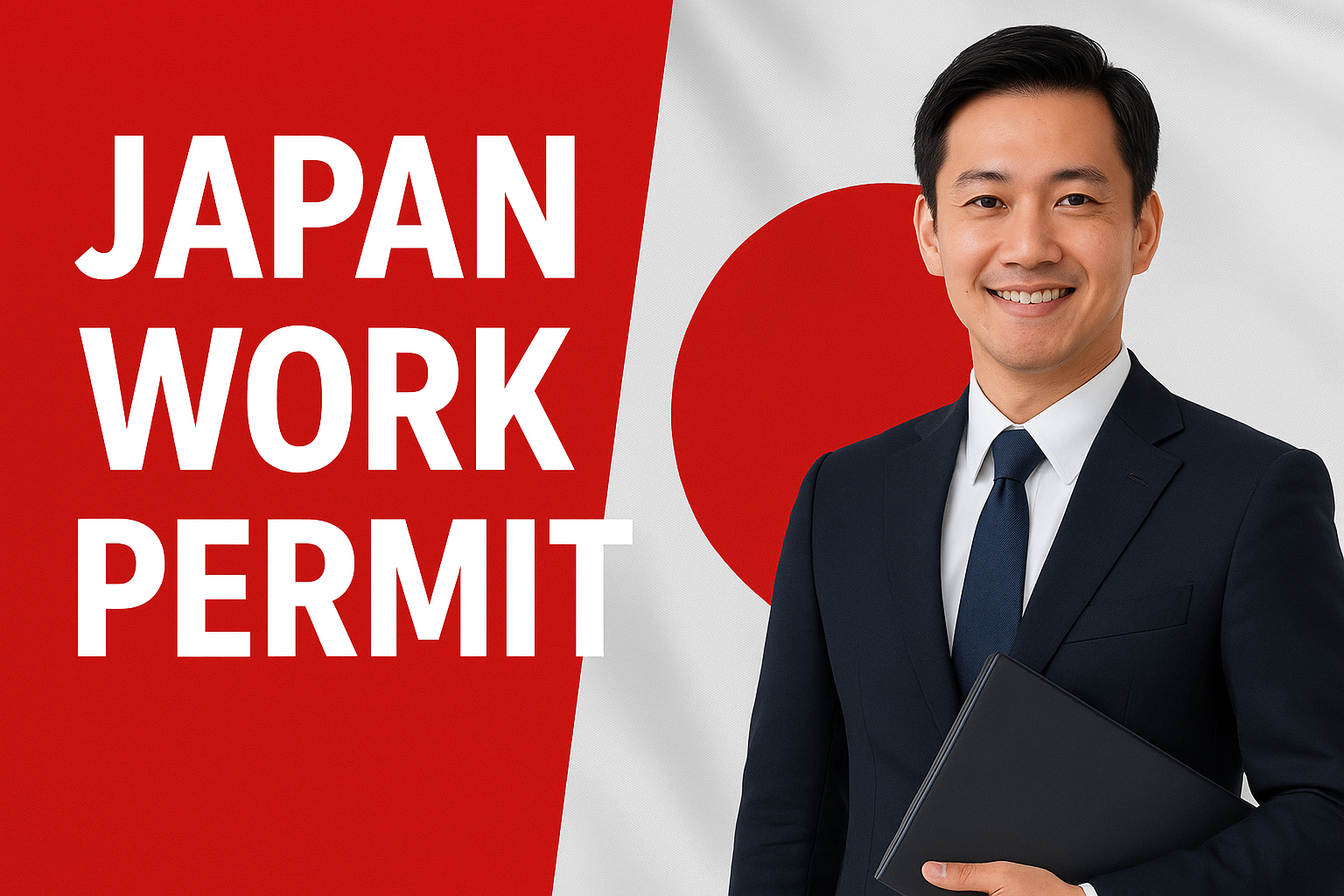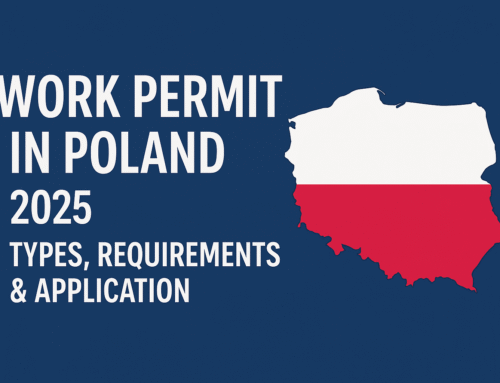Japan, known for its rich culture, advanced technology, and strong economy, has become one of the most attractive destinations for foreign professionals. Many people dream of living and working in Japan to experience its unique lifestyle, excellent career opportunities, and high standard of living. However, before starting a job in Japan, foreign nationals must obtain a Japan work permit.
In this comprehensive guide, we will explain everything you need to know about the Japan work permit, including its types, eligibility requirements, application process, costs, benefits, and tips for successful approval.
What is a Japan Work Permit?
A Japan work permit is a legal authorization that allows foreign nationals to work in Japan. It is issued by the Immigration Services Agency of Japan and is tied to a specific type of visa. Without a valid work permit or work visa, foreigners are not legally allowed to engage in paid activities in Japan.
The work permit is usually granted for professions that require special skills, academic knowledge, or technical expertise. Some jobs that do not require high-level qualifications may also be available under certain visa categories.
Types of Japan Work Permits
Japan offers several categories of work permits depending on the type of job. The most common types include:
1. Engineer/Specialist in Humanities/International Services Visa
- For jobs in IT, engineering, marketing, finance, education, and translation.
- Requires a university degree or equivalent work experience.
2. Highly Skilled Professional Visa
- Designed for highly skilled workers such as researchers, business managers, and professionals with advanced qualifications.
- Offers faster permanent residency and family benefits.
3. Specified Skilled Worker (SSW) Visa
- For industries facing labor shortages like construction, nursing care, agriculture, and hospitality.
- Divided into two types: SSW1 (renewable, allows limited job types) and SSW2 (leads to permanent residency).
4. Instructor Visa
- For teaching in schools or educational institutions.
5. Intra-Company Transferee Visa
- For employees transferred from a foreign company to its branch office in Japan.
6. Skilled Labor Visa
- For jobs requiring special technical skills such as chefs, pilots, or sports trainers.
7. Business Manager Visa
- For entrepreneurs or investors who want to start or manage a business in Japan.
Each visa category has different requirements and validity periods, usually ranging from 1 year to 5 years, with the possibility of renewal.
Eligibility Requirements for a Japan Work Permit
The eligibility criteria depend on the visa type, but general requirements include:
- Job Offer: You must have a job offer from a Japanese employer.
- Qualifications: Relevant education (usually a bachelor’s degree) or professional experience.
- Skills: Proof of technical expertise or language skills if required.
- Valid Passport: A passport with enough validity for the duration of your stay.
- Clean Record: No criminal history or previous immigration violations in Japan.
For Specified Skilled Worker (SSW) visas, applicants may also need to pass language and skills tests.
Application Process for a Japan Work Permit
Applying for a work permit in Japan involves several steps:
1. Get a Job Offer
- First, secure employment with a Japanese company. Your employer will play an important role in the visa application.
2. Certificate of Eligibility (CoE)
- Your employer applies for a Certificate of Eligibility at the Japanese Immigration Bureau.
- This document confirms that you meet the visa requirements.
3. Apply for a Work Visa
- Once the CoE is issued, apply for a work visa at your local Japanese embassy or consulate.
- Submit the CoE, application form, passport, photos, and other required documents.
4. Receive Your Visa
- Processing usually takes a few weeks. After approval, you can travel to Japan.
5. Residence Card
- Upon arrival, you will receive a Residence Card (Zairyū Card) at the airport, which acts as your official ID in Japan.
Required Documents
Commonly required documents include:
- Completed visa application form
- Valid passport
- Recent passport-size photos
- Certificate of Eligibility (CoE)
- Job offer/contract from a Japanese employer
- Educational certificates and professional qualifications
- Resume or CV
- Additional documents depending on visa type
Processing Time and Costs
- Processing Time: 1 to 3 months (CoE + visa issuance).
- Visa Fee: Usually around 3,000 to 6,000 JPY (approximately $25 to $50), depending on single or multiple entry.
- Employer’s Role: In most cases, the employer handles the CoE process.
Benefits of Having a Japan Work Permit
Obtaining a work permit in Japan comes with several advantages:
- Legal Employment: Work legally in Japan with full protection under labor laws.
- High Salary Opportunities: Japan offers competitive salaries, especially in IT, engineering, and healthcare.
- Cultural Experience: Enjoy Japan’s rich traditions, modern lifestyle, and safe environment.
- Family Benefits: Some visa types allow family members to join you.
- Permanent Residency Path: Certain visas provide a pathway to long-term residency or even citizenship.
Challenges of Getting a Japan Work Permit
While Japan is welcoming skilled foreign workers, there are some challenges:
- Language Barrier: Japanese language skills are often required, especially for customer-facing roles.
- Strict Requirements: Most visas require a degree or relevant experience.
- Limited Job Categories: Not all jobs are open to foreigners.
- Complex Paperwork: The process can be lengthy and requires accuracy in documentation.
Tips for a Successful Work Permit Application
- Secure a Job First: Without a job offer, getting a work permit is almost impossible.
- Prepare Documents Carefully: Ensure accuracy and completeness to avoid delays.
- Learn Basic Japanese: Improves job prospects and daily life in Japan.
- Choose the Right Visa: Apply under the correct visa category based on your job.
- Work with an Employer: Japanese employers are experienced in handling applications, so cooperate with them closely.
Frequently Asked Questions (FAQs)
1. Can foreigners work in Japan without a degree?
Yes, but only under certain visa categories like Specified Skilled Worker or Skilled Labor Visa. Most professional jobs require a degree.
2. Can I change my job in Japan with the same visa?
Yes, but you must notify immigration and ensure your new job matches your visa category.
3. How long is a Japan work permit valid?
It can be valid for 1, 3, or 5 years, depending on the visa type, and is renewable.
4. Can my family join me in Japan?
Yes, under the Dependent Visa, your spouse and children can live with you in Japan.
5. Is it easy to get permanent residency in Japan?
Permanent residency usually requires at least 10 years of residence, but highly skilled professionals can qualify faster.
Conclusion
A Japan work permit opens the door to exciting career opportunities and a high-quality life in one of the world’s most advanced countries. While the process may seem complicated, securing a job offer, preparing the right documents, and applying under the correct visa category will make it much smoother.
If you are planning to build your career abroad, Japan is undoubtedly a rewarding destination. With the right guidance and preparation, your dream of working in Japan can become a reality.
Read Also:






Leave A Comment